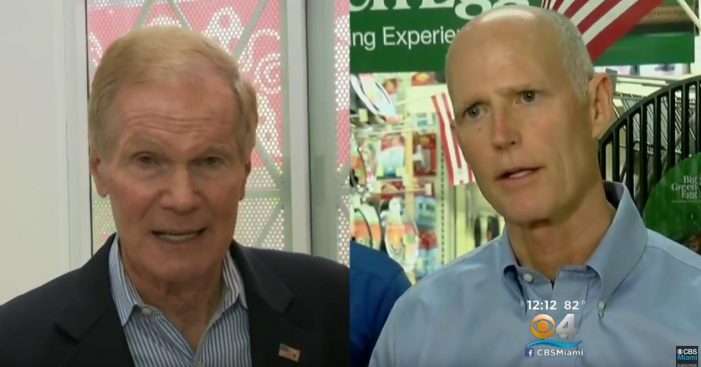By Lloyd Dunkelberger, The News Service of Florida
TALLAHASSEE — With a victory margin of a little more than a tenth of a percentage point out of 8.2 million votes cast, Gov. Rick Scott has won election to the U.S. Senate, ending the four-decade political career of Bill Nelson.
In the final vote tallies sent to the state Division of Elections on Sunday, Scott, a two-term Republican governor, held a 10,033-vote edge — or 0.12 percent — over Nelson, a Democrat who was seeking re-election to his fourth six-year term in the U.S. Senate.
The election went to an automatic machine recount when Scott failed to secure a lead of more than 0.5 percent in the initial count after the Nov. 6 election. The machine recount left the Republican with a 12,603-vote lead, or 0.15 percent, triggering the statewide manual recount that concluded at noon Sunday.
Scott’s lead was narrowed by 2,570 votes between the end of the machine recount on Thursday and the conclusion of the manual recount, but he has consistently held a lead since Election Day. The final results are expected to be certified when the state Elections Canvassing Commission meets Tuesday morning in Tallahassee.
Scott, who said Nelson “graciously conceded” in a phone call on Sunday, thanked Nelson “for his years of public service.”
While the voting recount process drew harsh accusations of fraud and political chicanery, numerous lawsuits and counter-lawsuits, Scott’s victory statement called for unity.
“My focus will not be on looking backward, but on doing exactly what I ran on: making Washington work,” Scott said. “I know change is never popular in Washington and that I’m just one person — but we have to start somewhere.”
Nelson’s defeat marked the end of the 76-year-old Democrat’s lengthy political career, which includes 18 years in the U.S. Senate, a dozen years in the U.S. House, six years on the state Cabinet and six years in the Florida Legislature.
“Well, things worked out a little differently than Grace and I had hoped. But let me say, I by no measure feel defeated,” Nelson said in a statement Sunday afternoon. “And that’s because I have had the privilege of serving the people of Florida and our country for most of my life.”
Nelson used his statement to urge support for issues including health-care policies that cover pre-existing conditions, Florida’s environment, Social Security and Medicare. He called for an end to “all forms of voter suppression.”
But he also said he would urge opposing political factions “to seek common ground with their colleagues on the other side of the aisle.”
“Inevitably, at times, that effort will fall short. But we have to try,” Nelson said. “We have to move beyond a politics that aims not just to defeat but to destroy; where truth is treated as disposable, where falsehoods abound, and the free press is assaulted as the ‘enemy of the people.’ ”
Scott’s Senate victory carried the hallmarks of his two previous statewide elections. All three campaigns were costly, hard fought and decided by extremely narrow margins.
A wealthy former health-care executive from Naples, Scott, 65, entered the 2010 governor’s race as a political novice and beat Democrat Alex Sink by a 1.2 percent margin, after spending more than $70 million of his personal fortune.
In his re-election bid in 2014, Scott edged former Gov. Charlie Crist by a 1 percent margin.
Scott’s 0.12 percent, or 10,033 votes, victory over Nelson was his costliest and tightest race. He spent more than $64 million of his own money on the contest, according to Federal Elections Commission reports. Total spending by Scott, Nelson and outside groups was well over $100 million.
Scott’s victory means that Florida will be represented by two Republican senators in the U.S. Senate for the first time since the Reconstruction era. Scott will join U.S. Sen. Marco Rubio, who won re-election to his second term in 2016.
In a statement, Rubio praised the working relationship he had with Nelson, despite their differing politics.
“Even though we often voted differently, not once did that interfere with our ability to work together,” Rubio said. “I will miss working with him very much.”
Nelson’s defeat underscores the fact that incumbent senators rarely lose re-election bids. The last time that happened in Florida was in 1986, when U.S. Sen. Paula Hawkins, a Republican, lost her re-election bid to Gov. Bob Graham, a Democrat.
Over the last half century, the majority of U.S. senators representing Florida have left office by deciding not to seek re-election.
Scott is expected to join the U.S. Senate when it convenes for a new session on Jan. 3. It will mean he will have to resign as governor before his term ends on Jan. 8, when Republican Gov.-elect Ron DeSantis takes office.
If Scott resigns early, Lt. Gov. Carlos Lopez-Cantera, a former state lawmaker from Miami, will become Florida’s 46th governor for a short period, before DeSantis’ term begins.
A similar scenario occurred in January 1987, when Graham resigned as governor to join the U.S. Senate. Lt. Gov. Wayne Mixson served three days as Graham’s successor in the governor’s office before former Gov. Bob Martinez took office.

